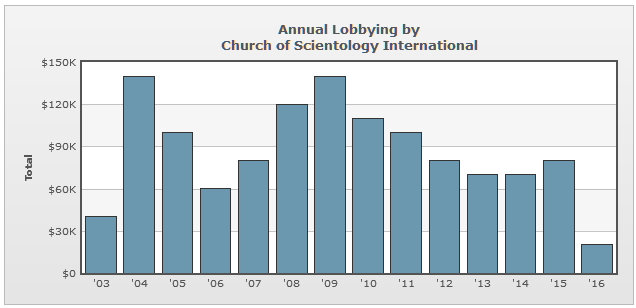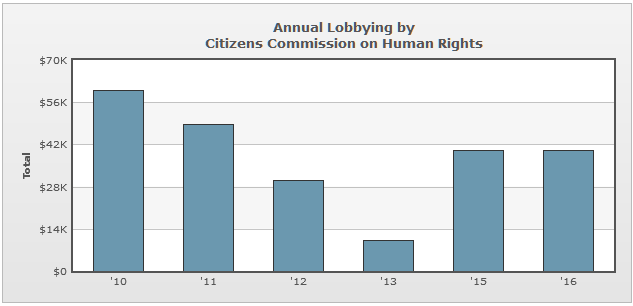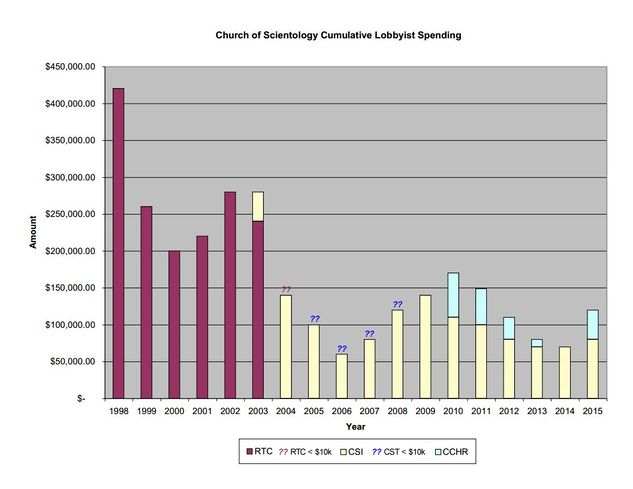Church of Scientology US Lobbying
Lobbying in the United States describes paid and pro bono activity in which special interests hire well-connected professional advocates, typically lawyers and former bureaucrats, to argue for or against specific legislation and regulations in decision-making bodies of government. It is a highly controversial phenomenon, often seen in a negative light by journalists and the American public when corporations use lobbying as a means of gaining influence for the benefit of their own profitable.[1] While the bulk of lobbying happens by business and professional interests who hire paid professionals, some lobbyists represent non-profits pro bono for social issues. Pro bono lobbyists typically coordinate advocacy activities to sway public opinion, form like-minded coalitions for promoting a common cause and socialize with local legislators at events like fundraisers and awards ceremonies.[2] Public disclosure documentation shows that the Church of Scientology lobbying activities primarily focuses on two areas: corporate interests related to swaying legislation and regulatory actions that financially benefits one or more of their organizations; and foreign policy leverage for enlisting help when other countries deny them the same non-profit tax breaks or religious freedoms they enjoy in the United States.
Annual spending summary
The Church of Scientology has a long history of using lobbyists to gain influence and special interest protections. Their efforts significantly increased after gaining tax exempt status from the IRS in 1993 with annual spending ranging in the high six-digit figures and cumulative totals topping $1 million dollars for a period of 5-6 years.[3] Public records currently available online from the Center for Responsive Politics, the US House of Representatives and the US Senate reflect a downward trend in recent years for money spent by Scientology entities where it took a dozen years for cumulative annual spending to top $1 million dollars.[4]
Religious Technology Center
 http://www.opensecrets.org/lobby/clientsum.php?id=F22357
http://www.opensecrets.org/lobby/clientsum.php?id=F22357
Church of Scientology International
 http://www.opensecrets.org/lobby/clientsum.php?id=D000048670
http://www.opensecrets.org/lobby/clientsum.php?id=D000048670
Church of Spiritual Technology
 http://www.opensecrets.org/lobby/clientsum.php?id=F3734
http://www.opensecrets.org/lobby/clientsum.php?id=F3734
Citizens Commission of Human Rights
 http://www.opensecrets.org/lobby/clientsum.php?id=F51254
http://www.opensecrets.org/lobby/clientsum.php?id=F51254
Cumulative totals
The following summary chart is derived from Open Secrets Lobbying Database.[5]
Registered agents
(add lobbyists by corp + meta info, quick reference table)
Pro bono lobbyists
According to public disclosure records (see External links), the following lobbyists volunteered to advocate to Scientology's best interest in (number?) branches of the US Government.
Peter Klestadt
Peter Klestadt, a Grunfeld, Desiderio, Lebowitz, Silverman & Klestadt lobbyist, worked as an unpaid emissary for Church of Spiritual Technology interests from (dates?). Scientology spent no money on Klestadt's services, which focused primarily on the following issues:
- (main issues list)
Richard Wortman
Rich Wortman, a Grunfeld, Desiderio, Lebowitz, Silverman & Klestadt lobbyist, worked as unpaid emissary for Church of Spiritual Technology interests from (dates?). Scientology spent no money on Wortman's services, which focused primarily on the following issues:
- (main issues list)
Quid pro quo lobbyists
According to public disclosure records (see External links), the following hired gun lobbyists advocated for Scientology's best interest in (number?) branches of the US Government.
Stephen Amitay
Steve Amitay, a Federal Legislative Associates lobbyist, worked as an advocate for Religious Technology Center interests from (dates?). Scientology spent approximately (moneyamt?) for Amitay's services, which focused primarily on the following issues:
- (main issues list)
Sam Brunelli
Sam Brunelli, a Team Builders lobbyist, worked as an advocate for Citizens Commission of Human Rights interests from (dates?). Scientology spent approximately (moneyamt?) for Brunelli's services, which focus primarily on the following issues:
- (main issues list)
Politician Dan Burton
Former Congressman Danny Lee Burton, a self-employed lobbyist, currently works as an advocate for Citizens Commission of Human Rights interests. Scientology has spent approximately (moneyamt?) for Burton's services since he first registered CCHR as his only client on (date?), and he has primarily focused on the following issues:
- (main issues list)
Lybra Clemons
Lybra Clemons, a Federal Legislative Associates lobbyist, worked as a hired gun advocate for Religious Technology Center interests from (dates?). Scientology spent approximately (moneyamt?) for Clemons' services, which focused primarily on the following issues:
- (main issues list)
David H. Miller
David Miller, a Federal Legislative Associates lobbyist, worked as an advocate for Religious Technology Center interests from (dates?). Scientology spent approximately (moneyamt?) for Miller's services, which focused primarily on the following issues:
- (main issues list)
Scientologist Greg Mitchell
Greg Mitchell, a self-employed lobbyist, currently works as an advocate for Church of Scientology International interests.
Scientology has spent approximately (moneyamt?) for Mitchell's services since he first registered CSI as a client with a effective date of October 1, 2003 when he declared the client's business or activities as "religion, social betterment." At that time, Mitchell described his current and anticipated lobbying issues as "Social betterment programs dealing with drug abuse/addiction, illiteracy, crime, moral decay, and detoxification."[6]
The following tables lists the General lobbying issue area codes Mitchell declared when he initially registered CSI as a client for his services (Form LD-1), in addition to the codes he listed to describe his actual lobbying activities in his semi-annual and quarterly disclosure reports (Form LD-2).
| Lobbying Code |
General Issue Area | Disclosure Type(s) |
Approximate Income |
|---|---|---|---|
| ALC | Alcohol & Drug Abuse | LD-1, LD-2 | $2.2k, $12k, |
| BNK | Bankruptcy | LD-2 | $2.2k, |
| EDU | Education | LD-1, LD-2 | $15k, $2.2k, $12k, $13.3k, $10k, |
| FOR | Foreign Relations | LD-2 | $10k, $10k, $13.3k, $13.3k, $13.3k, $7.5k, $10k, $15k, $20k, $15k, $13.3k, $5k, $25.7k, $2.3k, $20k, $20k, $20k, $16.7k, $20k, $20k, $20k, $20k, $10k, $10k, $20k, $20k, $20k, $20k, $20k, $20k, $20k, $20k, |
| HCR | Health Issues | LD-1, LD-2 | $15k, $2.2k, $12k, $13.3k, $10k, |
| IMM | Immigration | LD-2 | $13.3k, $15k, $15k, $20k, $15k, $13.3k, $15k, $10k, $3.3k, |
| LAW | Law Enforcement/Crime/Criminal Justice | LD-1, LD-2 | $30k, $4.4k, $24k, $13.3k, $10k, $10k, $20k, $13.3k, $15k, $15k, $10k, $15k, $26.6k, $13.3k, $15k, $10k, $15k, $10k, $15k, $6.7k, $15k, $4.3k, $1.4k, |
| REL | Religion | LD-1 | |
| TRD | Trade (Domestic & Foreign) | LD-2 | $20k, |
From 2004 through 2006, Greg Mitchell has also worked pro bono on behalf of Citizens for Social Reform, a Political Action Committee founded in 2001 by Scientologists.
Other representatives
The following experts were reportedly advocating for Scientology's best interest to the US Government in the past, but no public disclosure records exist in the online databases due to either date limitations and/or disclosure exemptions for certain types of social activities.
Consultant Joe Grieboski
...
Publicists Hill & Knowlton
...
Focus of lobbyist activity
(add agency/govbody by corp/lobbyist + meta info, quick reference table)
Governing bodies
US House of Representatives
US Senate
White House
Executive branch and cabinet departments
Department of Homeland Security
US Citizenship and Immigration Services
US Department of Justice
Federal Bureau of Prisons
US State Department
International Religious Freedom Commission
US Trade Representative
Defense and military branches
US Department of Defense
US Army
Other federal agencies
US Department of Commerce
US Department of Education
US Department of Health and Human Services
Food and Drug Administration (FDA)
Substance Abuse and Mental Health Services Administration (SAMHSA
Common issues
(add issue by agency/lobbyist + meta info, quick reference table)
Targeted legislation
- National Criminal Justice Commission Act
- International Religious Freedom Act of 1998
- Religious Freedom Restoration Act
- Second Chance Act
- Religious Worker Visa Extension Act
- Special Immigrant Nonminister Religious Worker Program Act
- Prison Litigation Reform Act
- Trans-Atlantic Religious Protection Act
- Freedom to Trade Act
- Patient Protection and Affordable Care Act
- Child Medication Safety Act of 2003
See also
 Direct Lobbying in the United States article from Wikipedia
Direct Lobbying in the United States article from Wikipedia Lobbying in the United States article from Wikipedia
Lobbying in the United States article from Wikipedia
Notes
- ↑ Evangeline Marzec of Demand Media (2012-01-14). "What Is Corporate Lobbying?". Chron.com. http://smallbusiness.chron.com/corporate-lobbying-11729.html. Retrieved 2016-07-29.
- ↑ Barry Hessenius (2007). "Hardball Lobbying for Nonprofits: Real advocacy for nonprofits in the new century". Palgrave Macmillan. ISBN 1-4039-8202-3. Retrieved 2016-07-30.
- ↑ David Dahl of St. Petersburg Times (1998-03-2). "Scientology's influence grows in Washington". sptimes.com. http://www.sptimes.com/Worldandnation/32998/Scientology_s_influen.html. Retrieved 2016-07-30.
- ↑ Hunter Walker of Business Insider (2015-04-8). "Meet Scientology's lobbyist who works the halls of Congress for the church". businessinsider.com. http://www.businessinsider.com/church-of-scientology-washington-lobbyist-2015-4. Retrieved 2016-07-30.
- ↑ Center for Responsive Politics. "OpenSecrets Lobbying." Retrieved 2016-08-02.
- ↑ Mitchell, G. (2003, November 25). LD-1 Lobbying Registration (PDF). Washington, DC: Clerk of the House of Reprsentatives, Legislative Resource Center. Retrieved 2016-08-02.
